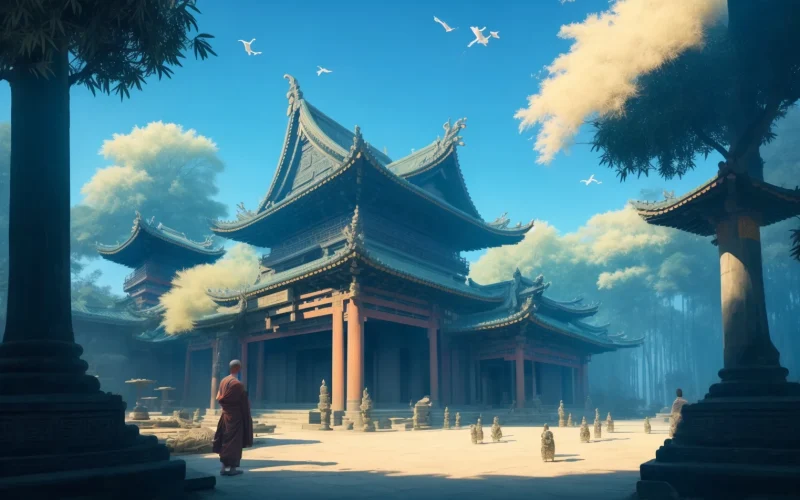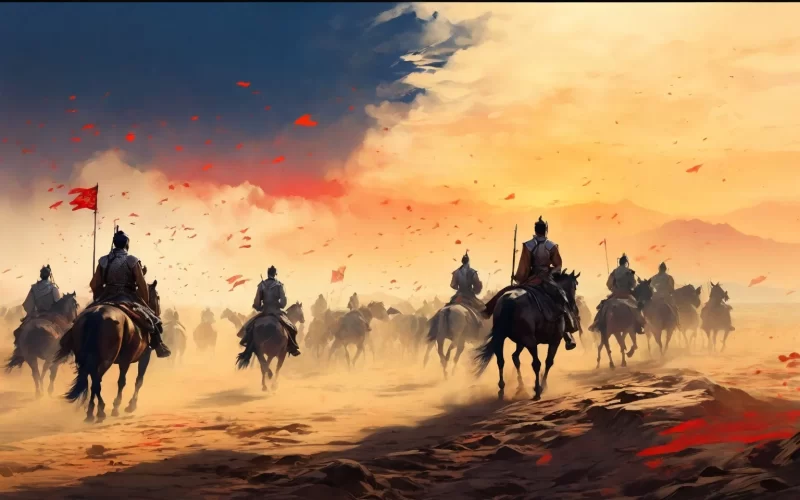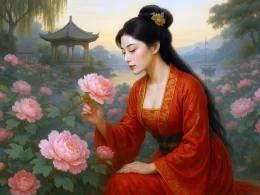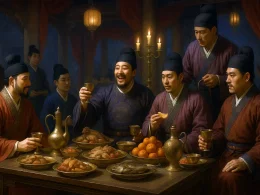Though a bugle breaks the crystal air of autumn, Soldiers, in the look-out, watch at ease today The spring wind blowing across green graves And the pale sun setting beyond Liang-chou. For now, on grey plains done with war, The border is open to travel again; And Tartars can no more choose than rivers: They are running, all of them, toward the south.
Original Poem
「书边事」
调角断清秋,征人倚戍楼。
春风对青冢,白日落梁州。
大漠无兵阻,穷边有客游。
蕃情似此水,长愿向南流。
Interpretation
Composed during a rare period of stability in the Tang frontier, this poem reflects the historical moment when Zhang Yichao's uprising successfully reclaimed ten prefectures from Tibetan control in 851 AD. Emperor Xuanzong appointed him Military Commissioner of the Returning Righteousness Army, marking the restoration of vast northwestern territories to Tang rule. Against this backdrop, Zhang Qiao paints an idealized vision of borderland tranquility and ethnic harmony.
First Couplet: "调角断清秋,征人倚戍楼。"
Diào jiǎo duàn qīng qiū, zhēng rén yǐ shù lóu.
The bugle's call cleaves autumn's crystal air, While guardsmen lean on watchtowers without care.
The opening couplet establishes the peaceful frontier atmosphere. The verb "cleaves" (断) emphasizes the bugle's far-reaching sound across the borderlands. The relaxed posture of "leaning" (倚) soldiers suggests security and absence of imminent threat, contrasting with traditional depictions of tense vigilance.
Second Couplet: "春风对青冢,白日落梁州。"
Chūn fēng duì qīng zhǒng, bái rì luò Liáng zhōu.
Spring breezes caress the Green Tomb's site, While sunset gilds Liangzhou in golden light.
This couplet weaves historical memory with contemporary peace. The "Green Tomb" (青冢) of Wang Zhaojun (the Han dynasty peace bride) symbolizes successful ethnic reconciliation, while the sunset over Liangzhou (a strategic frontier region) depicts current tranquility. The seasonal contrast between spring (renewal) and autumn (from previous lines) creates temporal depth.
Third Couplet: "大漠无兵阻,穷边有客游。"
Dà mò wú bīng zǔ, qióng biān yǒu kè yóu.
No armed barriers cross the desert wide, Now travelers tour the frontier with pride.
The transformation from warzone to tourist destination highlights the new peace. The juxtaposition of "no armed barriers" (无兵阻) and "travelers tour" (有客游) dramatically illustrates the changed reality, where the once-dangerous border now welcomes civilian visitors.
Fourth Couplet: "蕃情似此水,长愿向南流。"
Fān qíng shì cǐ shuǐ, cháng yuàn xiàng nán liú.
May tribal goodwill like these waters flow, Forever south to Central Plains below.
The concluding metaphor compares ethnic harmony to unhindered waterways. The southward flow symbolizes cultural integration with the Tang heartland, expressing the poet's hope for lasting peace through mutual understanding. The liquid imagery suggests both natural inevitability and desired political unity.
Holistic Appreciation
This frontier poem distinguishes itself by departing from conventional themes of harsh winters, warfare, and separation. Instead, it crafts a serene tableau of borderland tranquility through measured tranquility. The opening couplet establishes an autumnal calm with the sound of horns and frontier sentinels. The following couplet invokes the historical figure Wang Zhaojun, using her symbolic legacy of ethnic harmony to mirror contemporary circumstances. Concrete details in subsequent lines emphasize the absence of conflict and freedom of movement, while the closing couplet employs flowing water as a metaphor for cross-cultural unity, expressing the poet's vision for lasting peace.
The work's restrained power lies in its deliberate avoidance of martial glorification. Through quiet observation, it reveals both the preciousness of peace and the profundity of poetic sensibility. The interweaving of temporal perspectives and sensory impressions creates not merely visual beauty, but intellectual resonance that echoes across history.
Artistic Merits
• Landscape as emotional canvas: Delicate natural imagery - distant bugle calls, setting suns, spring breezes, flowing streams - becomes the medium for conveying borderland serenity and human sentiment.
• Historical allusion as depth: The reference to Wang Zhaojun's burial mound transforms into a multilayered symbol, connecting past diplomatic marriages with present harmony.
• Structural progression: The poem moves deliberately from tangible watchtowers and military signals to abstract natural elements, guiding readers toward the poet's contemplative conclusion.
• Formal precision: Careful parallelism in the central couplets creates rhythmic cadence while contrasting concrete/abstract, historical/immediate, and near/distant elements.
Insights
This work reveals the poet's profound valuation of peaceful coexistence during an era typically documented through warfare narratives. Its rarity lies in celebrating stability when most frontier poetry chronicled disruption. The poem demonstrates how verse can memorialize not only conflict's brutality but humanity's aspirations for concord. Through subtle imagery and historical consciousness, the poet articulates enduring truths about reconciliation that remain relevant for contemporary discussions of cultural understanding and shared prosperity.
Poem translator
Kiang Kanghu
About the Poet
Zhang Qiao(张乔, dates of birth and death unknown), a late Tang dynasty poet, hailed from Chizhou (present-day Guichi, Anhui Province) and attained the jinshi degree during the Xiantong era (860-874). Following the Huang Chao Rebellion, he retreated into seclusion at Jiuhua Mountain. His poetry, characterized by refined elegance and technical precision, predominantly features landscape and reclusive themes in the five-character regulated verse form, establishing him as a representative figure of the late Tang recluse poetry tradition.












